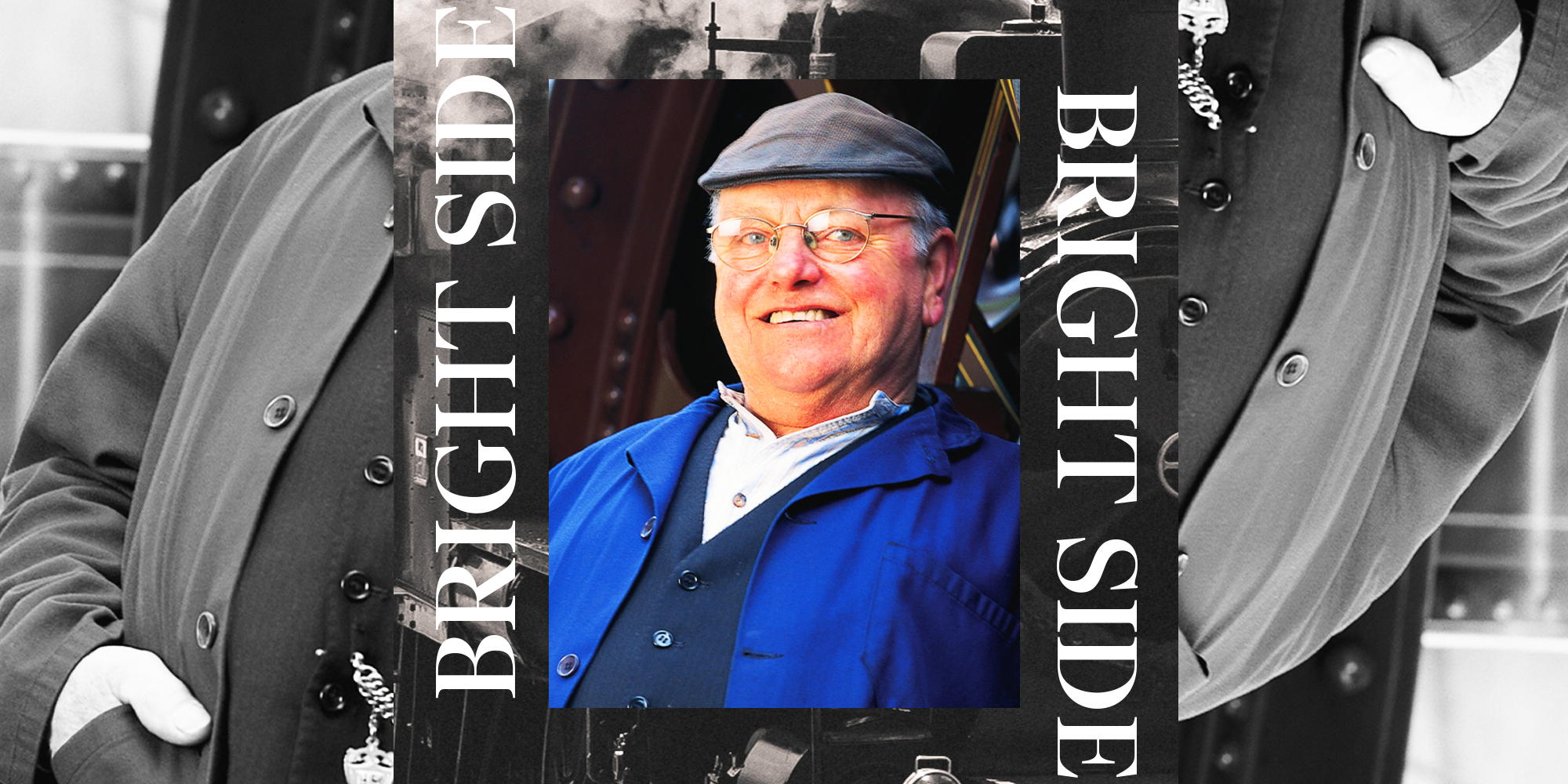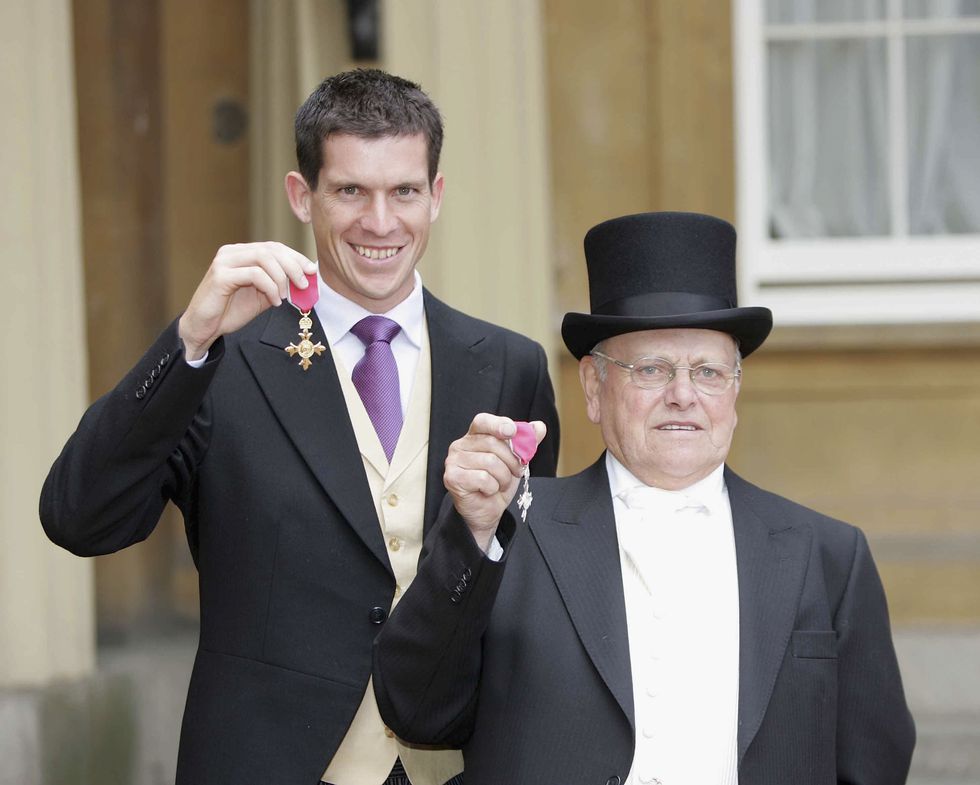It’s been a tough year, on that we can all agree. But it’s also been transformative. Amidst the trials and tragedies, there have been unexpected moments of progress and celebration. The Bright Side is a series in which we delve back into the past twelve months and pluck out those positives. Here, Tom Nicholson talks about finding comfort in the timeless void of the TV archives.
There’s a canon of people who’ve had a good pandemic: yer Joe Wickses, yer Captain Toms, yer Marcus Rashfords. If you were chiselling famous faces into a commemorative 2020 Mount Rushmore, they'd all be in the mix. One man’s done more for me personally than any of them though.
Fred Dibnah was a steeplejack from Bolton who moved from blowing up chimney stacks and fixing masonry to making TV programmes about industrial history between the late Nineties to mid-Noughties. If it puffed steam, spurted oil and took a small army of greying blokes to operate, he was into it. He looked like a beaming toddler, flat cap on and a pencil poking out from behind one ear.
Through the second lockdown I’ve been self-soothing with Fred, sitting on his knee at the fireside while he spins yarns. The more potentially deadly the situation, the giddier he gets. There was the time a traction engine he’d spent 20 years building skidded out of control down a mountain and smashed to pieces in a car park, for instance, or a reminiscence about a steam engine driver who’d regularly take him for midnight cab rides.
“I dunno worrappened to him,” Fred recalls cheerily. “Perhaps he died.”
Fred Dibnah’s Age of Steam, then Fred Dibnah’s Magnificent Monuments, then Fred Dibnah’s Building of Britain, then Fred Dibnah’s Industrial Age. Fred’s chirpy affinity with anything inefficient and potentially explosive has helped me through the bleakest bit of this rancid year.
I was thinking about what I’d watch next when the realisation came, just as the last of the cheap synth brass parped out: I’ve basically given up watching any new TV at all. I’ve been on a TV holiday since some time in August.
I didn’t really mean to stop watching new TV. I started the first lockdown out pretty fresh. We had Normal People and I May Destroy You, at least. I started catching up on bits and pieces I’d somehow missed in the last couple of years: Stath Lets Flats; Ghosts; Schitt’s Creek. Then come early summer, I went back to the start of some recent favourites: Chewing Gum; Naked Attraction; Five Guys a Week; Ambulance; Gogglebox, David Olusoga. It was great.
Somewhere around June the forward momentum dissipated. The Rick Stein collection was an unexpected hit. That flew by. (If you want rules to the drinking game, DM me.) So did Mary, Nigella, Nadia. I don’t think I missed a You’ve Been Framed Gold for three months. I scoured YouTube for How Clean is Your House?. I started feeling a bit disjointed.
As the nights drew in my tastes got woozier, more ambient. Architect Ian Nairn travelling across Britain tutting at service stations. The Eighties sitcom Butterflies. By the start of November I was shutting down every day with Bob Ross’s Joy of Painting, the televisual equivalent of a fistful of Xanax.
Then, finally, the deepest, most amniotic TV ever made: Dibnah. Dibnah, driving a steam carriage around a car park near Ulverston. Dibnah, slapping a cast iron crankshaft. Dibnah, chuntering to himself on a canal towpath. Dibnah. Dibnah. Dibnah.
But it’s not just us. For broadcasters, the last nine months have been a never-ending binge on archive TV. Unable to film anything new, British broadcasters have leaned on their archives. We should have had Euro 2020, Wimbledon and the Tokyo Olympics. Instead there was classic Wimbledon matches, vintage Olympic moments, old snooker tournaments, the BBC picking out full Euros games and ITV putting all of Euro '96 – thanks to the introduction of the golden goal, one of the most legendarily boring tournaments ever – on its streaming service.
By late summer, the BBC had worked out a way of freshening up its archive: Louis Theroux, Michael Palin, Stacey Dooley and Romesh Ranganathan all fronted clip shows which stitched together old segments and new reflections. Eastenders was replaced by compilations of its best moments. It started to feel a bit claustrophobic. It looked like new stuff, but it was just another reminder that there was no new stuff to be had. At least in the archives, nobody was making the best of it. My jumpy fretfulness of March, April and May turned into frazzled numbness. I missed my mum and dad and my family and my friends. The sense of blithe imperviousness I found in the archive was calming.
Then again, maybe ‘archive’ is the wrong word for it. I was wrong to think of it as an escape from the present. It’s not like anyone has to go rummaging around in the vaults for old programmes, after all. The past and present of TV exist side by side on streaming, and yanked out of its original state – suddenly bingeable, rewindable, shareable – old TV can become hallucinatory.
Take Rick Stein. His food travelogues are a montage of Partridgean gaffes, sniping about his crew, unbidden art criticism, and the invariable declaration that the most obviously European bit of any town is its nicest bit. Every recipe segment ends with a full plate fading into an empty one, onto which someone throws their knife and fork. Every single one. None of it makes sense, especially when you watch it next to the glossy magnificence of Cook Eat Repeat.
That sense of present-ness was became even more pronounced in the summer. As much as I dived head-first into the archive in 2020, this was the year that it spilled out into the real world too. The protests forced every broadcaster to reckon with the horrors in its archive – remember the Little Britain and Fawlty Towers furores, and The Inbetweeners one that wasn’t – just when there was far less new TV to talk about. The arrival of The Real McCoy on iPlayer at long last showed the power there is in placing older programmes in a new context and expanding the canon.
There are a lot more programmes waiting to be revived and refreshed. Personally, I think I’m completely purged now. I don’t want to fall any further into the timeless void. I want new stuff. I needed to wallow a bit in the comfort of the archive during the shittest bits of the year. But now I've given up the idea that it's somehow cut off from now, I'm ready to jump into whatever's new.
Like this article? Sign up to our newsletter to get more articles like this delivered straight to your inbox
Need some positivity right now? Subscribe to Esquire now for a hit of style, fitness, culture and advice from the experts














